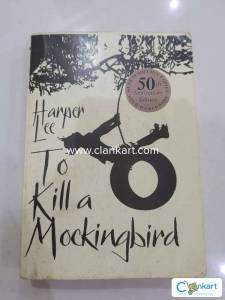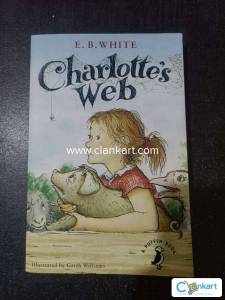Buy used Classics online in India
Buy Second Hand Books, Used Books Online In India
Someone Like You- Roald Dahl.
One of Roald Dahl's earliest collections of short stories, Someone Like You begins his bizarre, macabre and blackly amusing journey into the realm of the imagination and the dark side of human nature. A little boy sits on the stairs in 'The Wish', watching as the yellow and black carpet comes alive in the shape of writhing, glistening snakes. In 'Taste', the opening story, a gentleman's bet at a dinner party takes on sinister proportions. 'The Great Automatic Grammatizator' is the darkly satirical tale of how a machine threatens to make writers obsolete, and in 'Skin' an art dealer makes his fortune by trading in human flesh.--back cover
Malgudi Days
Four gems, with new introductions, mark acclaimed Indian writer R. K. Narayan's centennial Introducing this collection of stories, R. K. Narayan describes how in India "the writer has only to look out of the window to pick up a character and thereby a story." Powerful, magical portraits of all kinds of people, and comprising stories written over almost forty years, Malgudi Days presents Narayan's imaginary city in full color, revealing the essence of India and of human experience.An astrologer's day --The missing mail --The doctor's word --Gateman's gift --The blind dog --Fellow-feeling --The tiger's claw --Iswaran --Such perfection --Father's help --The snake-song --Engine trouble --Forty-five a month --Out of business --Attila --The axe --Lawley Road --Trail of the green blazer --The martyr's corner --Wife's holiday --A shadow --A willing slave --Leela's friend --Mother and son --Naga --Selvi --Second opinion --Cat within --The edge --God and the cobbler --Hungry child --Emden
50 Greatest Short Stories
50 Greatest Short Stories is a selection from the best of the world's short fiction, bringing together writings by great masters of the genre. Carefully picked for their timeless quality, readers are sure to be delighted by the inclusion of such favourites as 'The Gift of the Magi', 'The Lady with the Dog', 'The Curious Case of Benjamin Button', 'Rain' and 'Mrs Packletide's Tiger', to name but a few. This outstanding and wide-ranging anthology of stories is a collector's item, designed for readers to refresh their acquaintance with some of the world's finest writing and for newer readers to be introduced to it. Anton Chekov, Charles Dickens, Katherine Mansfield, Guy de Maupassant, F. Scott Fitzgerald, H. Rider Haggard, O. Henry, Rudyard Kipling, W.W. Jacobs, Virginia Woolf, D.H. Lawrence, Saki, Jerome K. Jerome, H.G. Wells, Kate Chopin, Ambrose Bierce, Jack London, Frank Stockton, Edgar Allan Poe, Stephen Leacock, James Joyce, Bram Stoker, Joseph Conrad, M. R. James, W. Somerset Maugham, R. L. Stevenson
Little Women by Louisa May Alcott (Hardcover)
Four of American literature's most beloved women Grown-up Meg, tomboyish Jo, timid Beth and precocious Amy-the four March sisters couldn't be more different. But with their father away at war, and their mother working to support the family, they have to rely on one another. Through sisterly squabbles, midnight plays, Christmas celebrations, happy times and sad, dreams, pranks, letters, illnesses and courtships, they discover that growing up is sometimes very hard to do.
The Great Gatsby by F. Scott Fitzgerald
An alternate cover edition for ISBN 9780141182636 can be found here, here, here and hereDay and night Jay Gatsby's mansion on West Egg buzzes with bright young things drinking, dancing and debating his mysterious character. For Gatsby - young, handsome, fabulously rich - always seems alone in the crowd, watching and waiting, although no one knows what for. Beneath the shimmering surface of his life he is hiding a secret longing that can never be fulfilled.In The Great Gatsby, Fitzgerald brilliantly captures both the disillusionment of post-war America and the moral failure of a society obsessed with wealth and status. But he does more than render the essence of a particular time and place, for in chronicling Gatsby's tragic pursuit of his dream, Fitzgerald re-creates the universal conflict between illusion and reality.
Jane Eyre by Charlotte Bront
Librarian note: An alternative cover for this ISBN can be found here.A gothic masterpiece of tempestuous passions and dark secrets, Charlotte Brontë's Jane Eyre is edited with an introduction and notes by Stevie Davis in Penguin Classics.Charlotte Brontë tells the story of orphaned Jane Eyre, who grows up in the home of her heartless aunt, enduring loneliness and cruelty. This troubled childhood strengthens Jane's natural independence and spirit - which prove necessary when she finds employment as a governess to the young ward of Byronic, brooding Mr Rochester. As her feelings for Rochester develop, Jane gradually uncovers Thornfield Hall's terrible secret, forcing her to make a choice. Should she stay with Rochester and live with the consequences, or follow her convictions - even if it means leaving the man she loves? A novel of intense power and intrigue, Jane Eyre dazzled readers with its passionate depiction of a woman's search for equality and freedom.
The Best Short Stories of Fyodor Dostoevsky - Brand new book
This collection, unique to the Modern Library, gathers seven of Dostoevsky's key works and shows him to be equally adept at the short story as with the novel. Exploring many of the same themes as in his longer works, these small masterpieces move from the tender and romantic White Nights, an archetypal nineteenth-century morality tale of pathos and loss, to the famous Notes from the Underground, a story of guilt, ineffectiveness, and uncompromising cynicism, and the first major work of existential literature. Among Dostoevsky's prototypical characters is Yemelyan in The Honest Thief, whose tragedy turns on an inability to resist crime. Presented in chronological order, in David Magarshack's celebrated translation, this is the definitive edition of Dostoevsky's best stories.
plane trigonometry part 1 class 11
ABOUT THE BOOK The "Classic Text Series" is a collection of books written by the most famous mathematicians of their time and has been proven over the years as the most preferred concept-building tool to learn mathematics. Arihant's imprints of these books are a way of presenting these timeless classics. Known as the early influencer on Ramanujan, SL LONELY was a great mathematician from 1800. The book "Plane Trigonometry" has been updated and deals with the modern treatment of complex concepts of Plane Trigonometry. Formulated as per the latest syllabus, this complete preparatory guide is compiled with detailed theories, Principle formulae, and a good collection of examples for an in- depth understanding of the concepts. The unique features accumulated in this book 1. Complete coverage of syllabus in 21 Chapters 2. A list of principle formulae for thorough revision 3. Important formulae are provided in the text 4. Enormous Examples for an in-depth understanding of topics 5. Works as an elementary textbook to build concepts 6. Chapterwise study, Answers, and Five-Figure Logarithmic and Trigonometrical Tables TABLE OF Measurement of angles; Sexagesimal and Centesimal Measure Circular or Radian, Measure, Trigonometrical Ratios for Angles Less Than A Right Angle values, Simple Problems In Height & Distance, Applications of Algebraic Signs to Trigonometry Tracing the Changes In The Ratios, Trigonometrical Ratios of Any Size & Sign, General Expressions for All Angles Having a Given Trigonometrical Ratio, Trigonometrical Ratios of The Sum & Difference Of Two Angles Product Formulae, Trigonometrical Ratios of Multiple and Submultiple Of Angles Explanation Of Ambiguities, Identities and Trigonometrical Equations, Logarithms, The Principle Of Proportional Parts, Relations Between Side &Trigonometrical Ratios Of The Angles Of A Triangle, Solution To Triangles, Heights & Distances, Properties Of A Triangle, Quadrilaterals, Trigonometrical Ratio, Inverse Circular Functions, Summation Of Some Simple Trigon
Meditations by Marcus Aurelius
Written in Greek, without any intention of publication, by the only Roman emperor who was also a philosopher, the Meditations of Marcus Aurelius (AD 121-180) offer a remarkable series of challenging spiritual reflections and exercises developed as the emperor struggled to understand himself and make sense of the universe. Ranging from doubt and despair to conviction and exaltation, they cover such diverse topics as the nature of moral virtue, human rationality, divine providence, and Marcus' own emotions. But while the Meditations were composed to provide personal consolation and encouragement, in developing his beliefs Marcus Aurelius also created one of the greatest of all works of philosophy: a timeless collection of extended meditations and short aphorisms that has been consulted and admired by statesmen, thinkers and readers through the centuries.
Charlotte's Web
One spring morning a little girl called Fern rescues a runt and names him Wilbur. But then Wilbur is sent to live on a farm where he meets Charlotte, a beautiful large grey spider. They become best friends and, when Wilbur is faced with a dreadful fate, Charlotte must find a very clever way to save him.--back cover
BOY Tales of Childhood
"I am only eight years old," I told myself. "No little boy of eight has ever murdered anyone. It's not possible!"In Boy, Roald Dahl recounts his days as a child growing up in England. From his years as a prankster at boarding school to his envious position as a chocolate tester for Cadbury's, Roald Dahl's boyhood was as full of excitement and the unexpected as are his world-famous, best-selling books. Packed with anecdotes — some funny, some painful, all interesting — this is a book that's sure to please.Roald Dahl, the brilliant and worldwide acclaimed author of Charlie and the Chocolate Factory, James and the Giant Peach, Matilda, and many more classics for children, also wrote scores of short stories. These delightful tales have often been turned into hit films or television episodes, and even today, Roald Dahl's stories continue to make millions of readers rejoice with his brilliant prose.
Literature fiction novel
The action of She Stoops to Conquer (1773) is largely confined to a night and a day in Squire Hardcastle's somewhat dilapidated country house: Young Marlow, on his way there to meet the bride his father has chosen for him, loses his way and arrives at the house assuming it is an inn. The prospect of meeting the genteel Miss Hardcastle terrifies the diffident youngster; but the serving-girl Kate - in fact, Miss Hardcastle, who chooses not to clarify the misunderstanding - immediately catches his fancy and cannot complain of a lack of ardour in her well-born suitor. After a series of trifling confusions and the inevitable eavesdropping-from-behind-a-screen, all is resolved so pleasingly that the comedy has been a favourite with amateur and professional companies and their audiences for over 230 years.
Premchand Godan ()
About the BookThis is the story of Hori, a poor peasant, who longs to own a cow. Hori is so desperate that he gets into an agreement with one of the villagers who gives him a cow in exchange. As much as Hori is delighted, he era, his brother, is jealous. What happens when he era kills the cow? One of the greatest Hindi novels of modern Indian literature, God a an was Premchand’s last complete novel. It continues to remain one of the greatest Hindi novels of modern Indian literature.About the AuthorBorn Dhanpat Rai Shrivastava on 31 July 1880 in Lamhi village near Varanasi, India, Munshi Premchand began his writing career in 1901. His first short novel, Asrar e Ma’abid (Secrets of God’s Abode), written in Urdu was published in a weekly between 8 October 1903 to February 1905. He wrote on a variety of topics including prostitution, poverty, dowry, child widowhood, and feudal system, using his works as a vehicle for arousing public awareness. He was the first Hindi author whose works featured social realism. Premchand has penned down hundreds of short stories, more than a dozen novels, plays, and several critical essays. His most celebrated works include Vardaan (1912), Seva Sadan (1918), Premashram (1922), Rangbhoomi (1925), Nirmala (1927), Pratigya (1927), Gaban (1931), Karmabhoomi (1932), Godaan (1936). Premchand breathed his last on 8 October 1936. One of the most influential writers of Indian literature, his works continue to remain popular and are translated in various foreign languages across the world.
Siddhartha (Buddha)
Herman Hesse's classic novel has delighted, inspired, and influenced generations of readers, writers, and thinkers. In this story of a wealthy Indian Brahmin who casts off a life of privilege to seek spiritual fulfillment. Hesse synthesizes disparate philosophies--Eastern religions, Jungian archetypes, Western individualism--into a unique vision of life as expressed through one man's search for meaning.
Pride and Prejudice
When Elizabeth Bennet meets Fitzwilliam Darcy for the first time at a ball, she writes him off as an arrogant and obnoxious man. He not only acts like an insufferable snob, but she also overhears him rejecting the very idea of asking her for a dance!As life pits them against each other again and again, Darcy begins to fall for Elizabeths wit and intelligence and Elizabeth begins to question her feelings about Darcy. When Darcy saves her youngest sister, Lydia, from a scandal, Elizabeth starts to wonder if her pride has prejudiced her opinion of Darcy.Through this tale about two warring hearts, Austen weaves a witty satire about life in eighteenth century England. And though it was published more than two centuries ago, Pride and Prejudice continues to enthrall readers to this very day.
Art of War, Strategy, History
Conflict is an inevitable part of life, according to this ancient Chinese classic of strategy, but everything necessary to deal with conflict wisely, honorably, victoriously, is already present within us. Compiled more than two thousand years ago by a mysterious warrior-philosopher, The Art of War is still perhaps the most prestigious and influential book of strategy in the world, as eagerly studied in Asia by modern politicians and executives as it has been by military leaders since ancient times. As a study of the anatomy of organizations in conflict, The Art of War applies to competition and conflict in general, on every level from the interpersonal to the international. Its aim is invincibility, victory without battle, and unassailable strength through understanding the physics, politics, and psychology of conflict.(Original publish date was circa 500 BCE.)
Story book
Miracle at happy bazaar is the biggest and best book of children’s tales by Ruskin Bond yet published. Personally selected by the author, these fifty stories are the finest of the several hundred tales spun by India’s favourite children’s author in a career spanning several decades. They include gems that have never been published before like ‘miracle at happy bazaar’, ‘chocolates at midnight’, ‘life is sweet, brother’, and ‘the old suitcase’ as well as classics that have delighted generations such as ‘the Blue umbrella’, ‘angry river’, ‘panther’s moon’, ‘the room of many colours’, and ‘the Cherry tree’. illustrated throughout, this is Ruskin Bond’s ultimate book for young readers. Ruskin Bond has been writing children’s fiction for over sixty years. His books have been part of the childhood of millions of Indians. The stories in this book show us why he is cherished by all those who love great storytelling. Many of these tales are filled with the authors special brand of gentle humour. Others are rip-roaring adventure yarns. There are accounts of ghosts to give you a fright and mysteries and thrillers to keep you awake at night. Animals are a favourite br>Theme and this collection is full of tigers, panthers, crocodiles, pythons, monkeys, bears, elephants, ostriches, and even a cassowary. There are tales of mischief, and others of magic, those with romance in them, many that speak of the joy and innocence of childhood, several that evoke the calm and peace of the hills, and much, much more. Playful, entertaining, magical, funny, and gripping, by turn, the stories in miracle at happy bazaar will be adored by readers of all ages
Relativity- The Special and The General Theory
An accesible version of Einstein's masterpiece of theory, written by the genius himselfAccording to Einstein himself, this book is intended "to give an exact insight into the theory of Relativity to those readers who, from a general scientific and philosophical point of view, are interested in the theory, but who are not conversant with the mathematical apparatus of theoretical physics." When he wrote the book in 1916, Einstein's name was scarcely known outside the physics institutes. Having just completed his masterpiece, The General Theory of Relativity—which provided a brand-new theory of gravity and promised a new perspective on the cosmos as a whole—he set out at once to share his excitement with as wide a public as possible in this popular and accessible book.Here published for the first time as a Penguin Classic, this edition of Relativity features a new introduction by bestselling science author Nigel Calder.For more than seventy years, Penguin has been the leading publisher of classic literature in the English-speaking world. With more than 1,700 titles, Penguin Classics represents a global bookshelf of the best works throughout history and across genres and disciplines. Readers trust the series to provide authoritative texts enhanced by introductions and notes by distinguished scholars and contemporary authors, as well as up-to-date translations by award-winning translators.
To the lighthouse
Text published by Wordsworths Classics in 1994. In 2002 was added an Introduction and Notes by Dr Nicola Bradbury, University of Reading . To the Lighthouse is the most autobiographical of Virginia Woolf's novels. It is based on her own early experiences, and while it touches on childhood and children's perceptions and desires, it is at its most trenchant when exploring adult relationships, marriage and the changing class-structure in the period spanning the Great War.
























